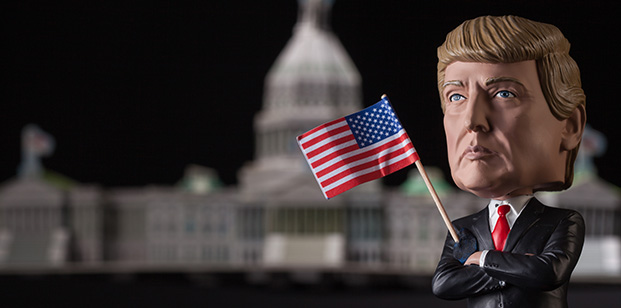April began with a bang with ‘Liberation Day’ – US President Donald Trump’s plan to ‘liberate’ the US from the perceived unfairness of trading arrangements with the rest of the world.
- Initial ‘reciprocal’ tariffs ranged from 10% to 50%
- China and the US continued to ramp up pressure on each other
- The IMF downgraded its US growth forecast
Trump unveils his tariffs: April began with a bang with ‘Liberation Day’ – US President Donald Trump’s plan to ‘liberate’ the US from the perceived unfairness of trading arrangements with the rest of the world. He unveiled a swathe of ‘reciprocal’ tariffs on countries around the world, ranging from 10% to 50%. The announcement triggered sharp declines in global markets and was widely criticised. International Monetary Fund (IMF) Managing Director Kristalina Georgieva commented: “Trade policy uncertainty is literally off the charts”.
“Trade policy uncertainty is literally off the charts” (IMF MD Kristalina Georgieva)
A volatile April: President Trump subsequently announced a 90-day ‘pause’ on reciprocal tariffs for all countries apart from China and, although markets generally regained some ground from their recent lows, the rest of the month continued to be marked by volatility, exacerbated by a series of tit-for-tat moves between China and the US. The ongoing uncertainty drove the US dollar down and bond yields up; meanwhile, the price of gold hit fresh highs. Over April as a whole, the Dow Jones Industrial Average Index fell by 3.2%, while the Nikkei 225 Index rose by 1.2% and the Dax Index climbed by 1.5%.
Pressure on the Fed: sentiment towards the US was further destabilised by President Trump’s ongoing criticism of Fed Chair Jerome Powell as he continued to urge Chair Powell to cut US interest rates. The IMF warned: “Central banks need to remain credible. And part of that credibility is built upon their central bank independence.”
IMF downgrades US growth forecast: having grown at an annualised rate of 2.4% in the final quarter of 2024, the US economy contracted by 0.3% in the first three months of 2025. Import activity rose sharply as companies sought to get ahead of the President Trump’s anticipated tariffs. The IMF cut its 2025 growth forecast for the US by 0.9 percentage points to 1.8%, citing “greater policy uncertainty, trade tensions, and a softer demand outlook”; tariffs are expected to continue to hamper growth in 2026.
US rate cuts on the horizon? The European Central Bank cut interest rates by 25 basis points in March, reducing its key rate to 2.25%. Policymakers believe that the disinflation process is “well on track”, but warned that intensifying trade tensions had caused the growth outlook to deteriorate. Elsewhere, investor sentiment in the US was lifted towards the end of the month by hopes of a summer rate cut.
To view the series of market updates through April, click here









